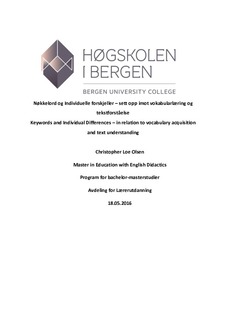| dc.contributor.author | Olsen, Christopher Loe | |
| dc.date.accessioned | 2018-02-01T14:41:04Z | |
| dc.date.available | 2018-02-01T14:41:04Z | |
| dc.date.issued | 2016-05-18 | |
| dc.identifier.uri | http://hdl.handle.net/11250/2481414 | |
| dc.description | Master in Education with English Didactics | en_GB |
| dc.description.abstract | Is using an explicit focus on vocabulary in the form of keyword identification an effective approach to help pupils understand a text about global warming and climate change, and can this focus on keywords facilitate pupils’ acquisition of new vocabulary items? This Master’s thesis explores several aspects related to explicit focus on vocabulary and individual differences between pupils, by using a quantitative approach. The individual differences explored are pupils’ ability to infer word meaning from context, and their receptive vocabulary size. A two-group quasi-experiment was conducted in a Norwegian lower secondary school. It examined the effect of using teacher-initiated focus on vocabulary on pupils’ understanding of a text about global warming and climate change, and acquisition of new vocabulary items. The experiment group received teacher-initiated focus on vocabulary, and the control group received additional focus on the content, during two English sessions dealing with a text about global warming and climate change. The data gathered during the quasi-experiment were analysed using independent means t-tests, Pearson’s correlation, and simple linear regression modelling. The results indicate that the explicit focus on vocabulary was not more effective than focusing on the content of the text in relation to text understanding. However, the explicit focus on content appears to have caused a higher degree of acquisition of the vocabulary items in the text. A positive relationship between pupils’ ability to infer word meaning from context and their vocabulary size was also found. This is in support of previous research. Finally, it was found that pupils’ ability to infer word meaning from context accounted for a high amount of the variance in pupils’ acquisition of new vocabulary items in the control group, but not in the experiment group. In light of these results, I conclude that explicit focus on vocabulary in the second language classroom is important if the goal is to expand pupils’ receptive vocabulary. Additionally, I make a strong case for the usefulness of this method in terms of helping pupils who are struggling with using contextual inferences of unknown words. Finally, I propose that some time should be spent on teaching pupils effective strategies related to contextual inferences of unknown words. | en_GB |
| dc.description.abstract | Er et eksplisitt fokus på vokabular i form av nøkkelord en effektiv måte å hjelpe elever med å forstå en tekst om global oppvarming, og kan dette fokuset på nøkkelord være med på å utvikle elevenes vokabular? Denne masteroppgaven utforsker flere aspekter ved det å bruke et eksplisitt fokus på vokabular og individuelle forskjeller via en kvantitativ metode. De individuelle forskjellene er elevenes evne til å forstå ukjente ord ut i fra kontekst, og deres vokabular størrelse. Et kvasieksperiment med to grupper ble gjennomført i en norsk ungdomsskole. I eksperimentgruppen ble det brukt et eksplisitt fokus på vokabular, og i kontrollgruppen ble det brukt et økt fokus på innholdet i teksten. Det ble gjennomført to undervisningstimer i begge gruppene. Dataene som ble samlet i løpet av kvasieksperimentet ble analysert ved hjelp av uavhengig t-tester, Pearsons korrelasjonskoeffisient, og enkel lineær regresjonsanalyse. Resultatene tyder på at det eksplisitte fokuset på vokabular ikke var mer effektivt enn fokuset på innhold i forhold til elevenes forståelse av teksten. Det eksplisitte fokuset på vokabular førte allikevel til at elevene lærte en større del av de ukjente ordene i eksperimentgruppen. Det ble også funnet et positivt forhold mellom elevenes evne til å forstå ukjente ord ut i fra kontekst og deres vokabular. Videre ble det oppdaget at elevenes evne til å forstå ukjente ord ut i fra kontekst forklarte en stor del av variasjonen i elevenes tilegnelse av nye ord i kontrollgruppen, men ikke i eksperimentgruppen. I lys av resultatene konkluderer jeg med at et eksplisitt fokus på vokabular er viktig dersom målet er å utvikle elevenes vokabular. Videre argumenterer jeg for at denne metoden kan hjelpe elever som sliter med å forstå ukjente ord ut i fra kontekst. Avslutningsvis foreslår jeg at det bør brukes tid på å lære elevene effektive læringsstrategier rettet mot det å forstå ukjente ord ut i fra kontekst. | en_GB |
| dc.language.iso | eng | en_GB |
| dc.publisher | Bergen University College | en_GB |
| dc.rights | Attribution-NonCommercial 3.0 Norway | * |
| dc.rights.uri | http://creativecommons.org/licenses/by-nc/3.0/no/ | * |
| dc.title | Keywords and Individual Differences – in relation to vocabulary acquisition and text understanding | en_GB |
| dc.title.alternative | Nøkkelord og Individuelle forskjeller – sett opp imot vokabularlæring og tekstforståelse | en_GB |
| dc.type | Master thesis | en_GB |
| dc.subject.nsi | VDP::Samfunnsvitenskap: 200::Pedagogiske fag: 280 | en_GB |

